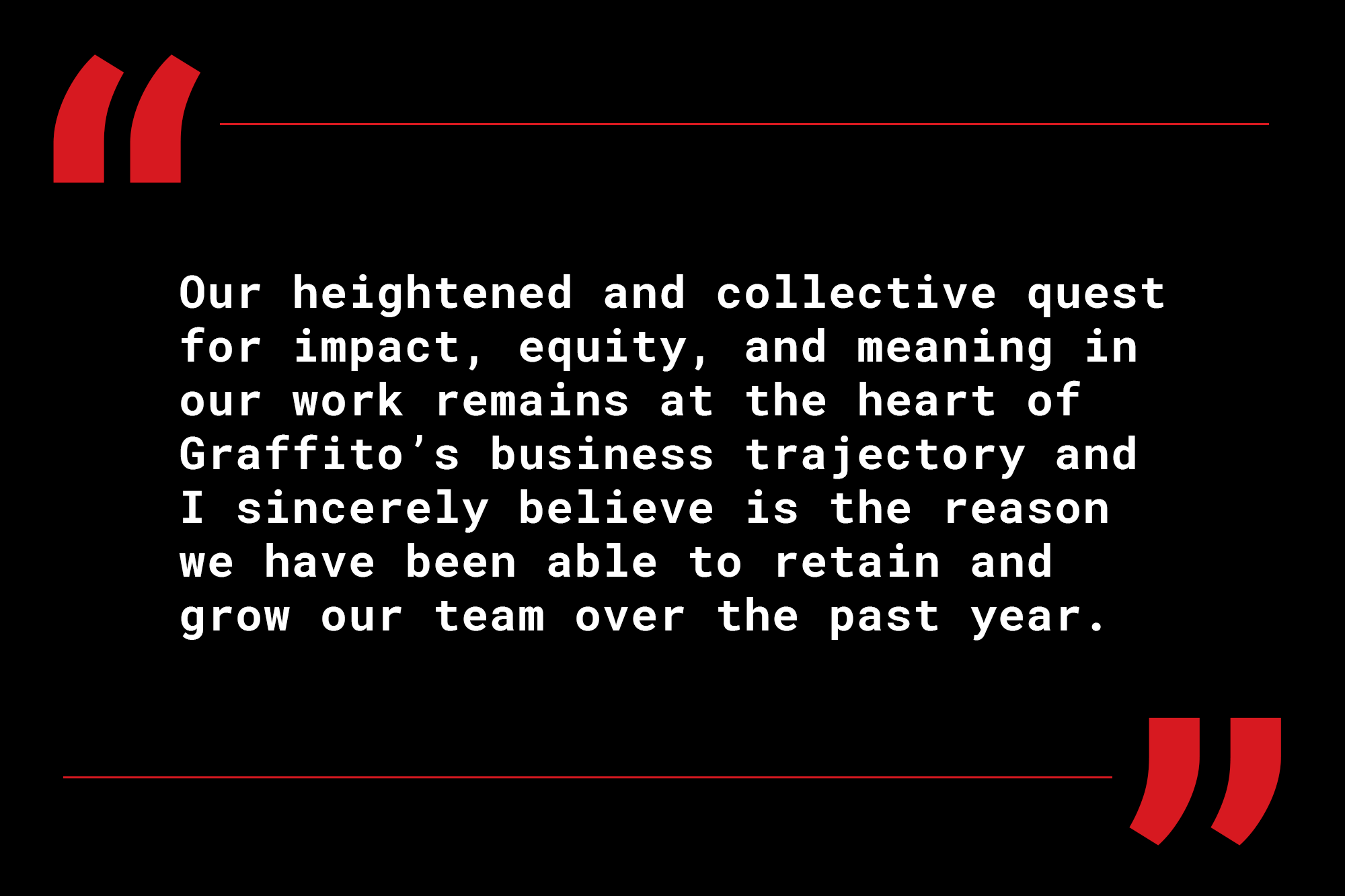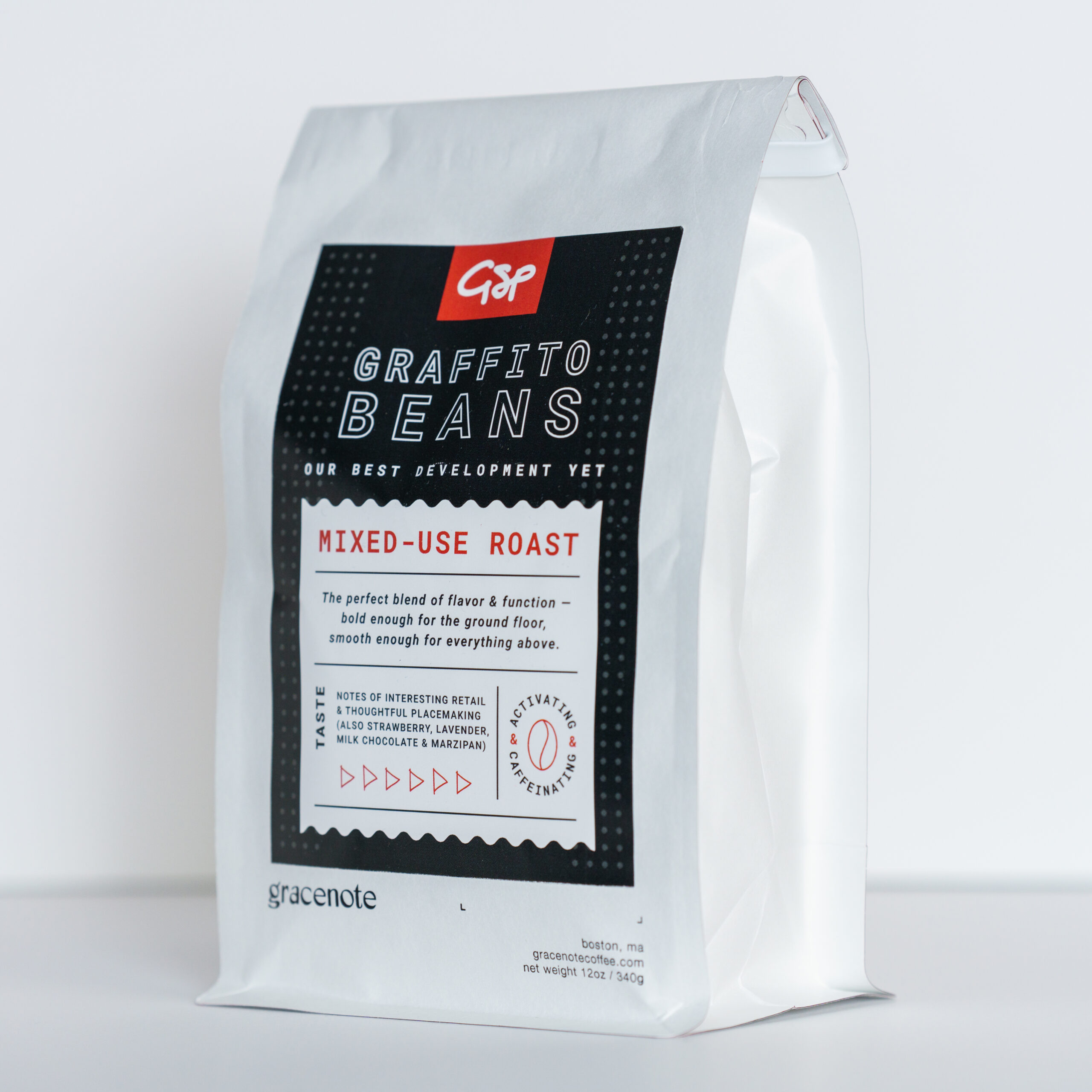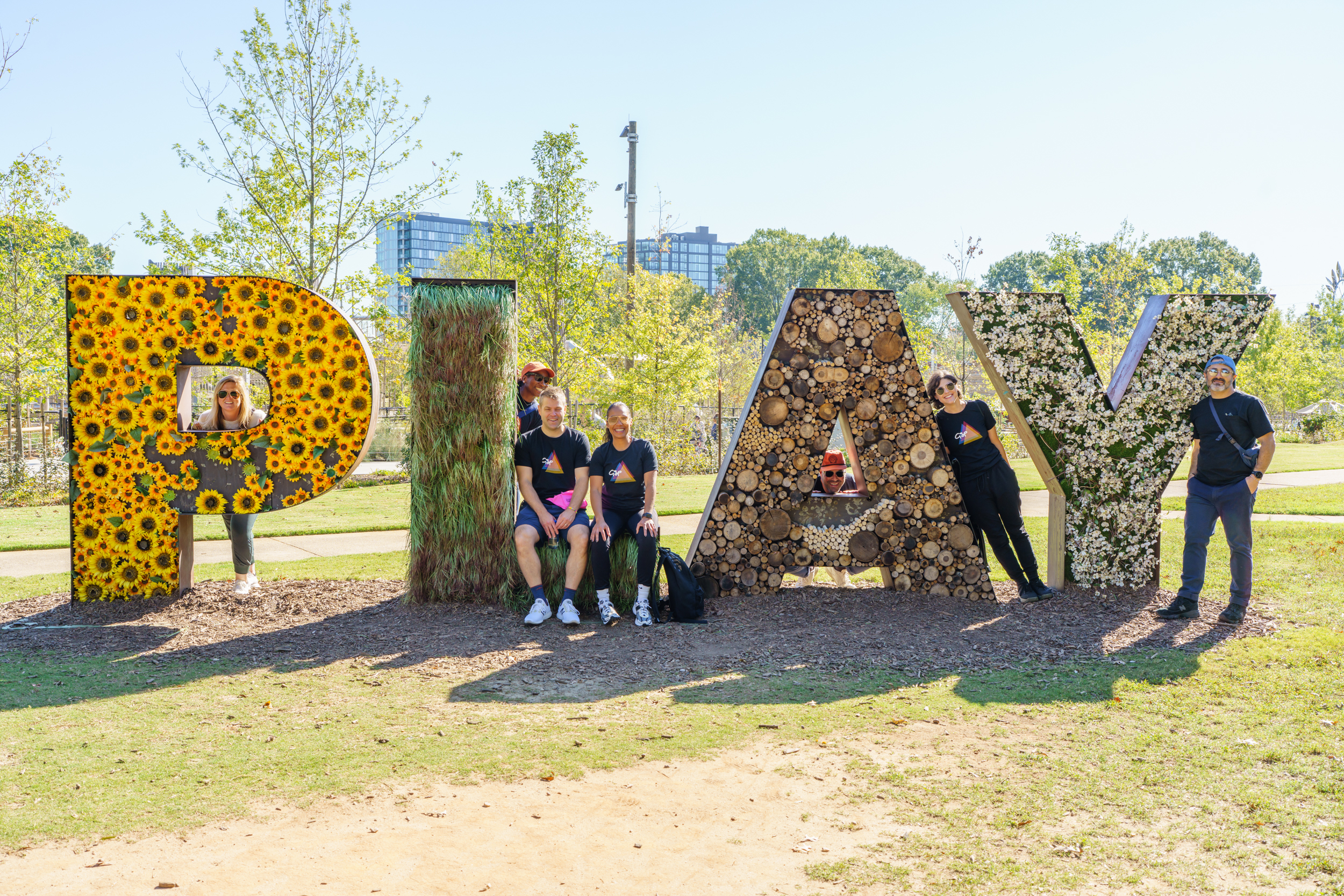Update #18: 2021 Optimism (Mostly)
Dear Clients & Colleagues,
We are busy over here, which is good news. When 2021 began, I was expecting a super busy Q3; but the uptick in new projects, leasing activity, and deal flow for Graffito started right at the beginning of Q2 and has continued through today.
As we enter fall and look towards 2022, the Graffito team will be approaching all of what we do with the same intensity, commitment to learning, flexibility, and willingness to pivot as we did in 2020 when the pandemic first hit and these updates began. Our heightened and collective quest for impact, equity, and meaning in our work remains at the heart of Graffito’s business trajectory and I sincerely believe is the reason we have been able to retain and grow our team over the past year.
It’s certainly been a while since my last client update, so herein I’m providing some thoughts on (i) our ongoing DEI work, (ii) a very exciting/important new hire, (iii) quick notes on The Graffito Podcast, Season 2, and (iv) some general reflections re: the pain but also the opportunity that lies ahead in retail real estate.
I. Diversity, Equity, Inclusion Work
Nowhere has our commitment to learning and willingness to pivot been more pronounced in 2021 than in our efforts to be a more anti-racist organization. Through regular weekly DEI conversations we have developed more comfort in talking about racism together as a team, in our work, and in our lives. Through the hiring of a third-party cultural competency and equity consultant, Graffito is getting closer to a new strategic plan that is largely based on anti-racism and justice. Through the engagement of a very thoughtful employment lawyer, we are revisiting workplace norms, policies, have created a new employee handbook, and are retooling the way we hire (and talk about hiring). This inward-facing work will help us build a more inclusive environment at Graffito that facilitates belonging for employees of varying races, religions, genders, and personal identities. And in turn, by retooling our own business, goals, and corporate values, we can have more impact and efficacy in our outward-facing work with you all.
This work has touched all of our planning for the future. We have changed the way our scope of works are written; our tenant outreach and marketing happens; and our project/client selection process. Earlier this year said efforts triggered the realization that we need a leader to help us tackle operations, develop new processes, prioritize the right new business, hold us all accountable, and act as a chief of staff. It’s a big role, and we found someone great.
II. GSP New Hire
In July Melissa Castro joined Graffito as Director of Operations & Strategy. We don’t do press releases, but if we did it would have looked something like this:
Graffito SP announces that Melissa Castro has joined the firm as Director of Operations and Strategy. In this role Melissa will serve as Graffito’s chief operational staff member. In partnership with Graffito’s President, Melissa will lead Graffito’s corporate agenda as related to talent management, new business development, and anti-racism.
Melissa’s prior roles have focused on operations, program management, and strategy. Most recently Melissa was Director of Business Development at Commonwealth Kitchen, a Boston based non-profit food business accelerator with a mission to build a new food economy grounded in racial, social, and economic justice. Melissa holds a B.A. in Marketing and Communications from the University of Massachusetts Amherst and an M.B.A. from Babson’s F.W. Olin Graduate School of Business.
III. Graffito Podcast, Season 2
Season 2 of The Graffito Podcast was a huge success. With Drew leading the charge as host, producer, photographer, editor, etc. we hit on a lot, with some brilliant, all female guests. Most relevant to you all are probably the episodes with Boston Mayoral Candidate Michelle Wu; restauranteur and founding member of the Boston Black Hospitality Coalition, Nia Grace; Kendall Square Association President, C.A. Webb; and Janelle Nanos of The Boston Globe. Check out all Season 2 episodes here: The Graffito Podcast, Season 2.
The podcast touched on a slew of issues related to sustainable city building, place keeping/making, and retail development. Of all of the issues we discussed on air, there is one issue that continues to come up in every conversation we are having today with retailers: staffing.
IV. Retail Staffing (and more pain ahead)
Staffing remains a huge challenge for all retailers and restaurants in Greater Boston. This was the case in 2019 pre-pandemic, but in 2021 it’s even harder. There are a multitude of factors that have created the current staffing crisis — some, but not all, are pandemic related — but the biggest one in places like Boston, NYC, DC, SFO, Miami, etc is related to housing. Without the development of more housing in Greater Boston — affordable, middle-income, and market rate — food service and retail workers will continue to get priced out of our urban neighborhoods. And if they can’t live here, they aren’t going to work here… This is why, at Graffito, we don’t share the belief of many that when federal unemployment benefits lapse tomorrow the hardship for retailers will simply go away. Further, with a supply constrained labor market costs will continue to escalate and retailers will get more squeezed. Compounded by rising costs of goods, construction, health care, etc. things just aren’t going to get any easier for our beloved shop owners, chefs, makers, and service providers.
So, if the foregoing is true, how do we continue to (responsibly) get retail deals done?
V. Three Takeaways re: Future Retail Deal-making
First, don’t force it. Retail won’t necessarily work where it once did. Think about ground floor uses as part of a larger network/collection of activation elements, of which retail is just one category. We’ve written a lot about this over the past year (see: If not retail, then what?) and for any of you that have received a Graffito deliverable over the past few years, you know how we feel about non-retail active uses. Further, keep in mind, just because retail doesn’t work today doesn’t mean it won’t work in a few years as market conditions change and evolve.
Second, it’s all about the operator/team, not the use. A great use with a crap team is just a crap deal. Period. But a great team with a flawed concept will pivot and have a chance of surviving. Further, by focusing on the team and operator vs. the use, we can more valuably and expeditiously meet our collective diversity, equity and inclusion goals.
Third, we must change our understanding of what makes a great retailer. Business models that are not omnichannel should scare you. Operators that don’t leverage social media are at a huge disadvantage. Retailers that lack strong and transparent diversity, equity and inclusion efforts will struggle to connect with the next generation of shoppers. Underwriting by landowners that looks solely at hypothetical pro-formas and historic sales in other contexts is not dispositive.
At Graffito, we are asking retailers and restaurants about their website functionality, POS systems, Instagram followers, supply chain, staffing plans, DEI programs, and a slew of other items that weren’t necessarily part of our due diligence five years ago. It’s making us smarter, and it’s making our projects better. So, despite all the challenges, there is a lot of good work to do out there. And we are excited to work with you all as 2021 heads into the fall season.
But first, have a great end of summer and Labor Day weekend,
/Jesse
Past Client Updates here: https://graffito.com/client-updates/




